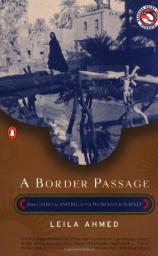Reading Group Guide
Discussion Questions
A Border Passage: From Cairo to America, A Woman's Journey

1. One of the core issues addressed in A Border Passage is the process by which our identities are constructed. Discuss what you think were your own "defining" moments or "formative" years. What made them so crucial? Were they politically driven?
2. Chapter 11 opens with these words from Zora Neale Hurston, "I remember the very day that I became colored." Why is this quote significant to the book?
3. After Ahmed's father died, she experimented with what she called "automatic writing." What did you think of this passage? Was she really tapping into another realm?
4. Ahmed said that she learned about religion through watching "hidden messages: attitudes, posture, a glance of approval." How did you learn about religion? Discuss what types of "hidden messages" influenced your spiritual development.
5. Before reading A Border Passage, what were your feelings about Islam? What were some misconceptions about Muslim women dismantled by Ahmed in the book? Similarly, what did you discover about the feminist movement in America?
6. Although many cultures thrive through oral traditions, educational systems continue to emphasize the written literary tradition. In short, "if it isn't written down, it didn't happen." What are the implications of assigning more credence to the written word than to oral traditions? How did this affect Ahmed's experience in Abu Dhabi? How do you think it affected your own education?
7. Do you think Ahmed succeeds in objectively disentangling the controversial political, religious, and cultural conflicts explored in her book? Can you pinpoint which narrative techniques were most helpful to you?
8. "I think that we are always plural. Not either this or that, but this and that." What does Ahmed mean by this? What different traditions, cultures, and histories converge to make you who you are?
9. Did the cultural backgrounds of the women with whom Ahmed grew up in Egypt inform her childhood opinions of them? Consider especially how her perception of her traditional Arabic speaking mother was utterly transformed throughout the course of the book. Have you undergone similar evolutions in how you perceive your own parents? If so, what do you think caused them?
10. Were any of Ahmed's childhood memories similar to your own? If so, please describe.
A Border Passage: From Cairo to America, A Woman's Journey
- Publication Date: June 1, 2000
- Paperback: 307 pages
- Publisher: Penguin Books
- ISBN-10: 0140291830
- ISBN-13: 9780140291834






